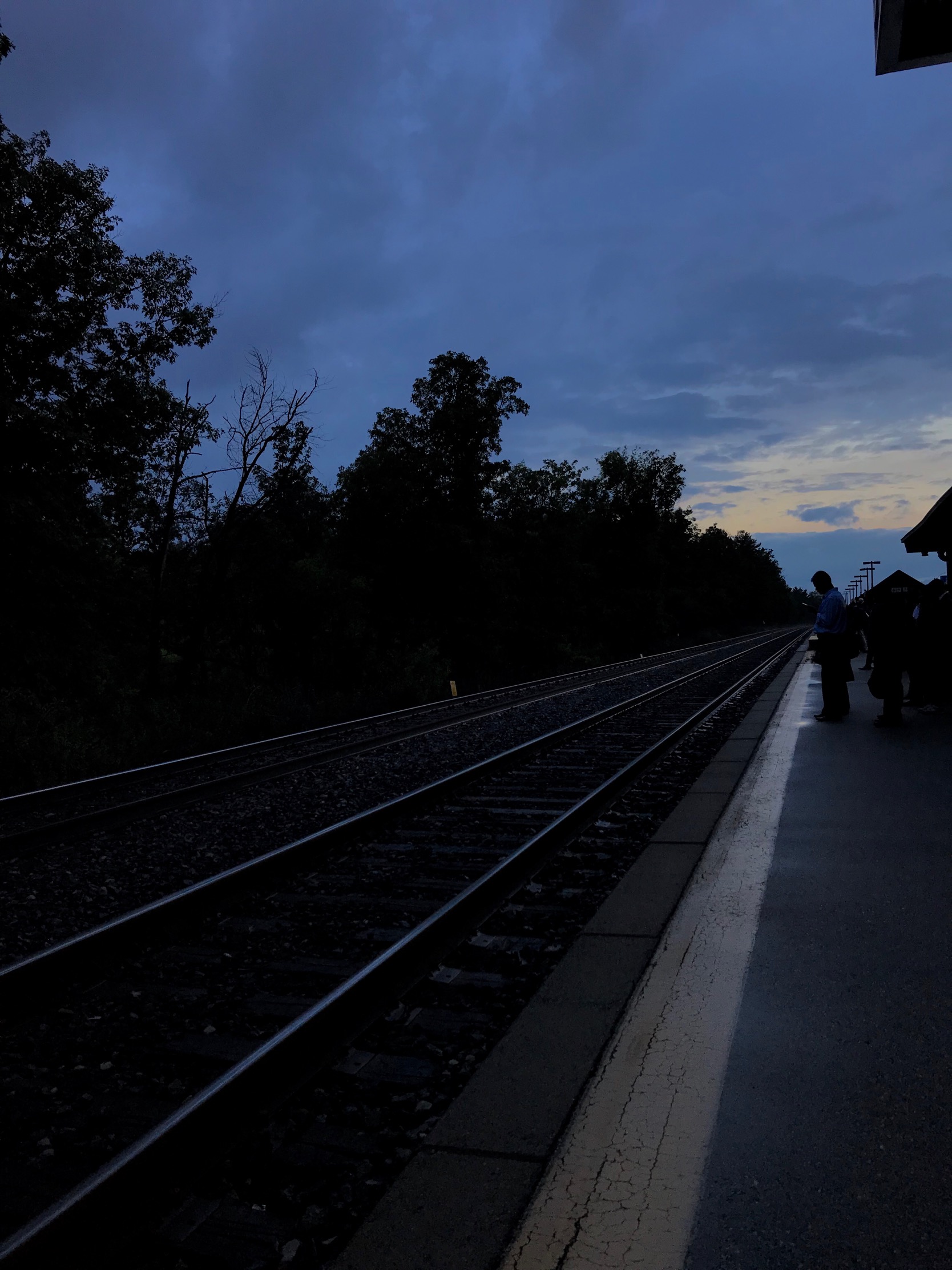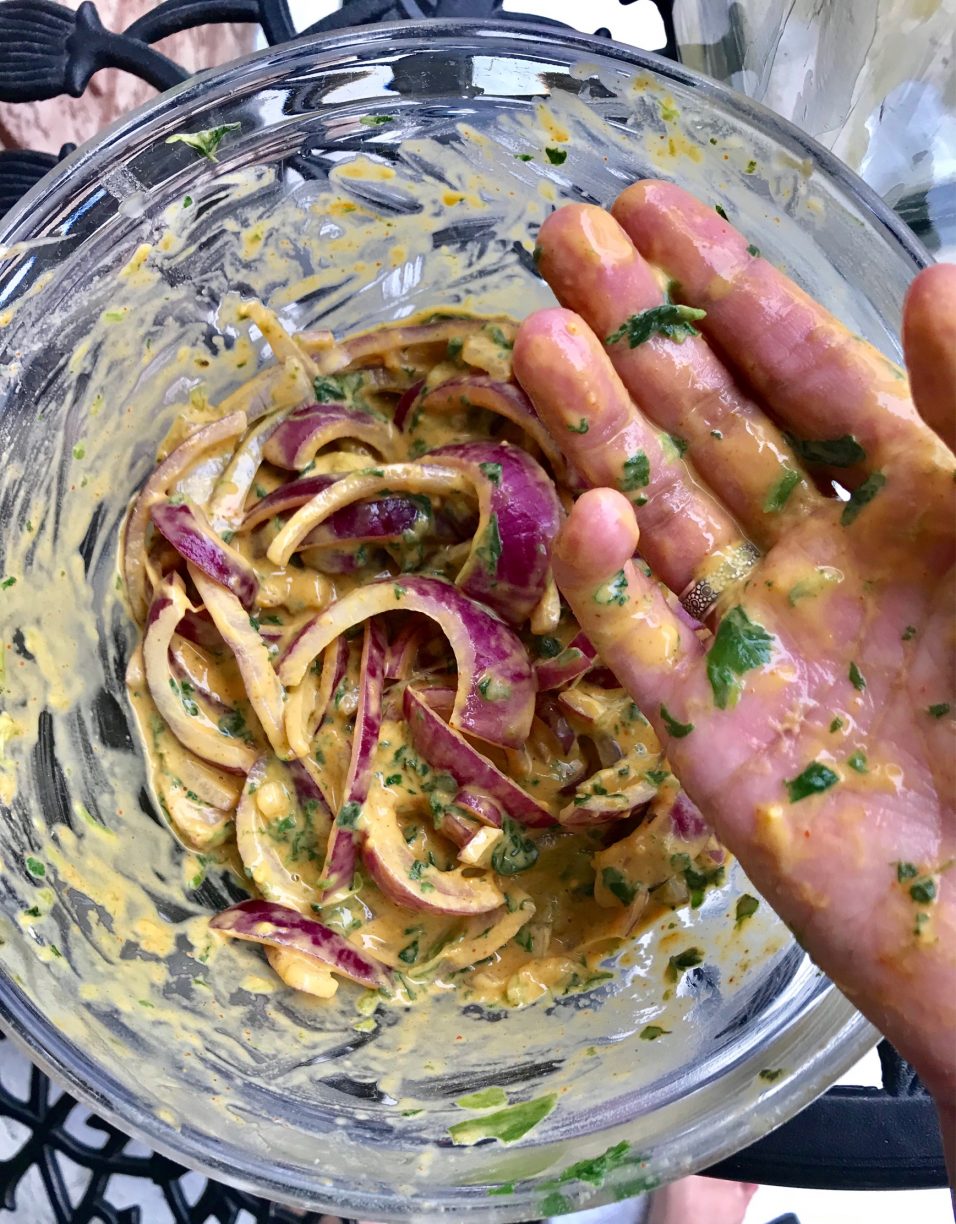October 4, 2018
Toronto, Canada
My fan made that same clanging noise over and over again as if it was exhausted from going through the motions with a broken part. The woman who lives across the street is a school bus driver and was leaving the house just as I opened the window. Her sweater was the kind you couldn’t buy; there were skipped stitches on the back. Someone must have spent weeks knitting it for her. I could smell oatmeal, which meant that Abu, my dad, was already awake.
Ami’s fingers rubbing coconut oil into my scalp, Nani sprinkling chaat masala on a bowl full of phalsey, rows of glass bangles in Karachi’s Bohri bazaar—these are the things that I think about when I can’t fall asleep. It was 6 a.m., I had only slept three hours, the sun would rise in a little while, and I would miss my Fajr prayers. I quickly took a shower and then wrapped my large white prayer dupatta around my head. Kneeling on the floor with my forehead pressed against my prayer mat has been an exercise in being thankful since I was 13. It’s been over a year since Ami, my mom, passed away and over three years since she was diagnosed with cancer. As her primary caregiver, I got so used to staying up with her at night that falling asleep has become a daily struggle. At this point, I’m resigned to being exhausted; it’s normal to be exhausted as a woman in this world anyway.
For breakfast, I had two rusks, thick tea biscuits that I bought from the local Pakistani grocery store, and a strong cup of tea steeped with cloves. I dipped the rusk into the tea so it was soaked but not soggy. If you watched that scene from It Happened One Night when Clark Gable is teaching Claudette Colbert how to dunk a donut in coffee, you would know what I’m talking about. Abu and I left the house at 7 a.m. to catch our 7:25 train to Union Station. We arrived at the station 10 minutes early. The man with an injured left leg was back after a week, he carried a small green lunch box to work and wore dress shirts that were too tight around the stomach. We could see that the pain was worse than the last time we saw him, but he still took the stairs down to the platform.
People began to line up. The trees had begun to lose their leaves, soon they would go back to looking like streaks of ink against the morning sky. Fall had started. Soon my bones would begin to feel like they were slowly crumbling, becoming dust everywhere the cold air touched them. Standing in front of the yellow line that divided the people from the rusted metal of the railway tracks, I thought about the space between the sky and the earth, the space that separates countries and the water that connects them, the space between bodies passing quickly past each other during the day and bodies pressed against each other at night.
When the train arrived, we headed upstairs to the quiet zone so that Abu could take a nap. The woman sitting in front of me flipped back and forth between two pages of a brown leather notebook with the word Diary embroidered on the front. I pulled out my red notebook, which I bought online from a Japanese stationery store, and wrote down a backstory about her. This was a writing exercise my creative writing professor had taught me, and I never stopped doing it. This woman must have lost her memory after midnight on a street covered in ice, the kind you can’t see. They said her car slammed into a tree, but no one else was hurt. They said she should be thankful she survived. Once a week she took a train out to the city to see a “specialist” who helped her cope with not remembering.
 Aeman Ansari
Aeman AnsariI have a different job every day of the week. One day I’m a barista, the next day I’m an ESL English teacher. This morning, I was working at a literary agency. It was Frankfurt Book Fair season, and the workday went by in a blur of meetings and Excel Sheets. For lunch, I had chana daal with spinach, brown rice, and a couple of chapters of Plum Johnson’s They Left Us Everything, a memoir that follows her struggle as she cares for her elderly parents and then attempts to recover from losing them. I made a habit of reading books that make me cry in public a year ago. Days after my mom’s funeral, a distant relative told me that mourning is a private thing and mourning for too long means you’re weak; I’ve been mourning publicly since. I made it a habit to never listen to idiots many, many years ago.
As soon as we got home, my one-year-old niece Inara ran around in circles calling out my dad’s name, one of the few words she knows how to say. I changed into one of Nani’s old kurtas and took her to the park behind our house. She picked up insects off the ground and tried to collect them in my hand; she rolled her eyes at me when I told her not to stand up in the swing. My siblings, father and I all live together, and most days I cook for the whole family. Today I made kharhi—a curry made from gram flour, yogurt, turmeric, coriander powder, cumin powder, red pepper, and pakoras. After heating up oil in a pan and sauteing onions, I added all of the other ingredients for the curry and cooked it until it became thick and yellow. I then mixed the pakora batter with my hands and fried them. While the rice boiled, I listened to songs from the Indian black and white movie Awara and counted my cooking-related injuries; there were seven. The burn marks on the pads of my fingers from flipping the paratha over in the pan, the cut at the base of my palm from slicing a karela in half. I used to look at Ami’s hands and tell her that she was careless, only careless people get hurt so often. I moved back and forth between this life and that life. Caught constantly between my open wounds pressed against sharp edges and my peeling skin, and her open wounds pressed against sharp edges and her peeling skin. As always, my rice was too soft; my onions were charred.
After dinner, I watered our house-plants. We have ten, and they are all over 15 years old. We bought them shortly after immigrating to Canada, when we lived in North York. I was reading an essay a few days ago which said that plants begin to wither after their caretaker passes away. These were Ami’s plants and it’s been a struggle to keep them alive since she’s gone, but my brother repotted them recently, which helped.
Inara had finally fallen asleep after I rubbed coconut oil into her scalp and we all took turns rocking her back and forth in our arms. Around 11 p.m. everyone headed to their rooms to prepare for the next day and I pulled out my Urdu-English dictionary. Abu had ordered this dictionary earlier this month, and I started using it to learn how to read and write in Urdu as soon as it arrived. I was still at the second letter of the alphabet, ب. I wrote the words basera (shelter), baqiyat (remnant), bikharna (scatter), bint (daughter) and bex (origin), over and over again. After that, I said them over and over again, and eventually, I fell asleep in Nani’s kurta, in Ami’s house, in the hours before Fajr.
Aeman Ansari






